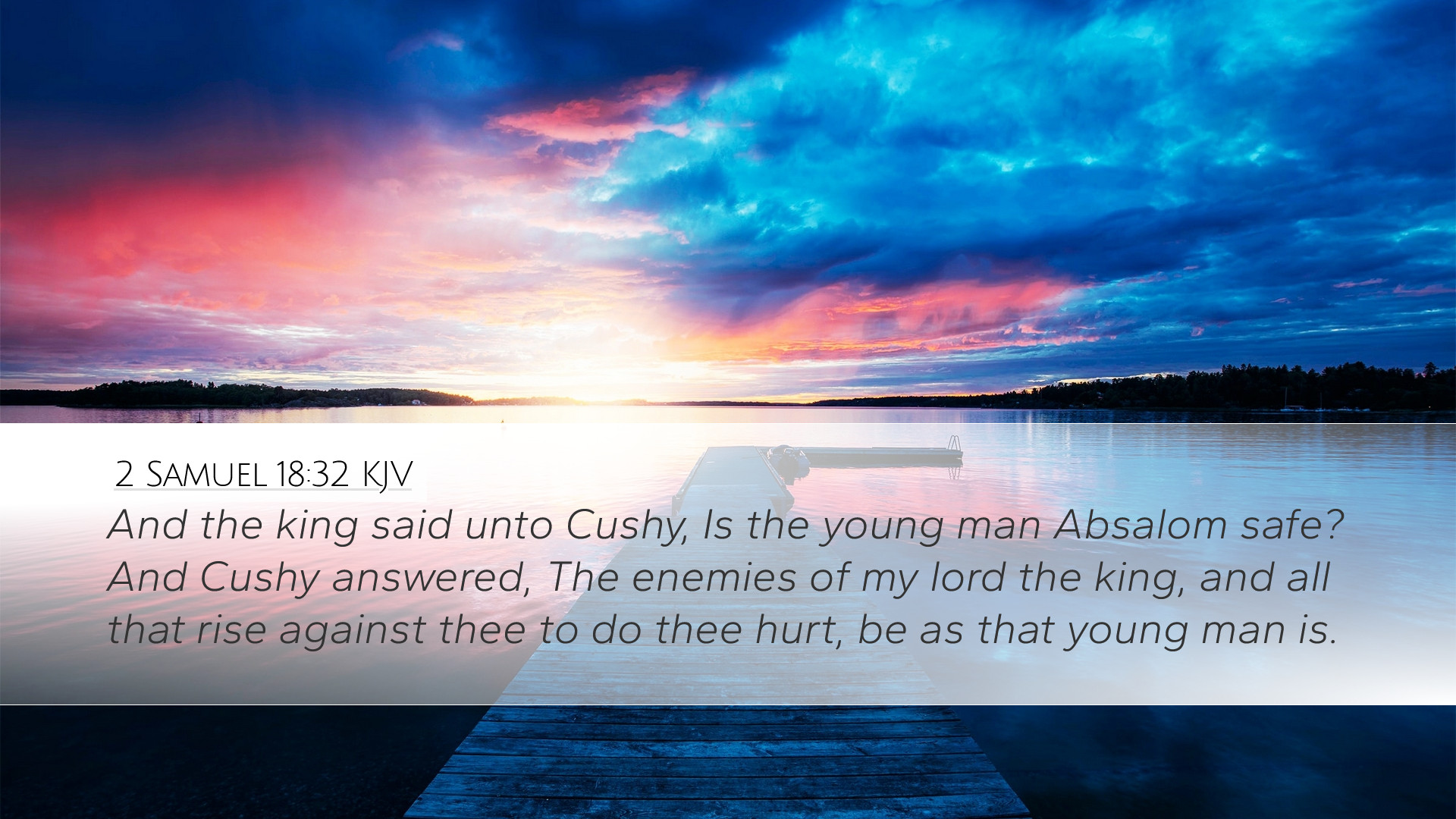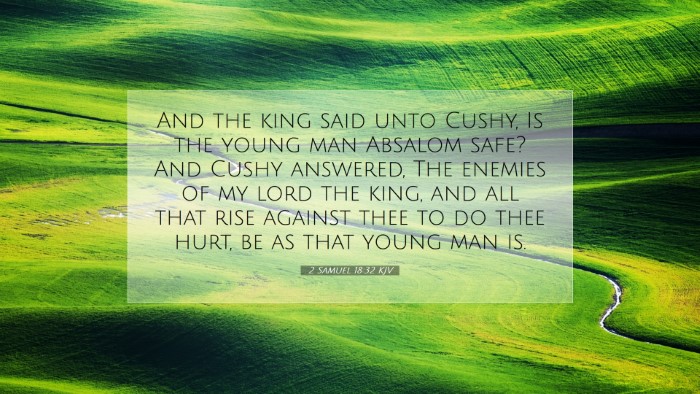Commentary on 2 Samuel 18:32
Bible Verse: "And the king said unto the Cushite, Is the young man Absalom safe? And the Cushite answered, The enemies of my lord the king, and all that rise against thee to do thee hurt, be as that young man is." (2 Samuel 18:32)
Overview
This poignant verse captures a moment of deep emotional intensity as King David inquires about the fate of his son Absalom during the midst of a rebellion. This encounter unfolds the bittersweet reality of a father’s love contrasted with the responsibilities of a king, providing rich ground for theological and pastoral reflection.
Commentary Insights
Matthew Henry's Commentary
Matthew Henry emphasizes the duality of David's position as both a father and king. He notes that David's concern for Absalom epitomizes parental love, even amidst rebellion. This situation highlights the tension between familial affection and the moral standings of justice. Henry states:
"Though Absalom had been a most ungrateful rebel, yet he was David’s son. This speaks to the heart of parental compassion that transcends the child’s betrayal."
Henry further remarks on the Cushite's answer, which is loaded with implication. The Cushite’s news effectively tells David that while his kingdom may be at peace, it does so at the cost of his son’s life, raising critical discussions about the burdens of leadership and the outcomes of rebellion.
Albert Barnes' Notes on the Bible
Albert Barnes expounds on the portrayal of the messenger, the Cushite, whose response to David is fraught with diplomatic and emotional weight. Barnes explains that the Cushite was aware of David’s deep affection for Absalom and thus delivered his message in a manner that was both respectful and sensitive. Barnes states:
"The Cushite delicately avoids directly naming Absalom’s fate, instead opting to offer a metaphorical reflection on his demise that acknowledges the king's anguish."
This adds a layer of complexity to the messenger’s role as not just a bearer of news, but as someone who must navigate the king’s emotions carefully. Barnes also interprets the phrase, "the enemies of my lord the king, and all that rise against thee," indicating a universal portrayal of enemies and foreshadowing the inevitable consequences of rebellion against authority.
Adam Clarke's Commentary
Adam Clarke elaborates on the psychological implications of the verse, particularly focusing on David’s paternal instincts. Clarke suggests that David's question indicates hope, possibly reflecting a father’s belief in redemption even amidst returning news of destruction. He articulates:
"In the heart of even the most wounded, there is always a flicker of hope for reconciliation, revealing the depth of a father’s love."
Clarke also discusses the significance of the Cushite’s ambiguous response, interpreting it as a way of illustrating the moral decay resulting from Absalom’s rebellion. He articulates the notion that the Cushite symbolizes how the conflict ultimately yields despair not just for David but for the nation at large.
Theological Reflections
As we examine 2 Samuel 18:32, the theological implications of this verse extend beyond a mere historical account, delving into themes of sin, discipline, and parental love. David’s grief represents the divine heart’s lament over lost relationships due to rebellion against God.
The Burden of Leadership
This passage serves as a critical reflection for leaders within spiritual communities. The weight of leadership often involves enduring personal loss while maintaining the well-being of a community. David's response reminds us that leaders must sometimes make decisions that lead to painful outcomes, emphasizing the inevitable struggles between personal and communal responsibilities.
Redemptive Hope Amidst Suffering
Clarke’s insight into a father's hope may serve as a reminder to believers that even in the deepest sorrow, redemption is a central theme in the biblical narrative. The Christian understanding of sin and grace is vividly encapsulated in this father’s love—even when faced with the repercussions of rebellion, there remains an invitation toward reconciliation.
Conclusion
In closing, 2 Samuel 18:32 serves as a poignant illustration of the interplay between love, leadership, and the consequences of sin. It prompts both pastoral reflection and theological discourse, urging us to consider the complexities of human relationships in the light of God's overarching narrative of grace and redemption.


